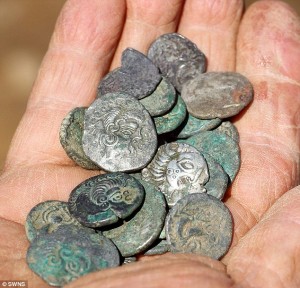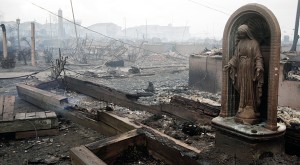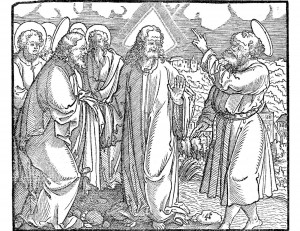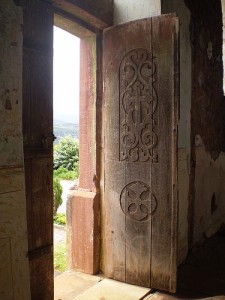====================
This sermon was preached on Sunday, November 4, 2012, at St. Paul’s Episcopal Church, Medina, Ohio, where Fr. Funston is rector.
(Revised Common Lectionary, All Saints, Year B: Isaiah 25:6-9; Psalm 24; Revelation 21:1-6a; and John 11:32-44. These lessons can be read at The Lectionary Page.)
====================
 Today, following church tradition, we step away from the calendar of Ordinary Time and, instead, commemorate the Feast of All Saints. That festival is specifically held on November 1, but tradition allows us to celebrate the saints also on the Sunday after that date, so here we are.
Today, following church tradition, we step away from the calendar of Ordinary Time and, instead, commemorate the Feast of All Saints. That festival is specifically held on November 1, but tradition allows us to celebrate the saints also on the Sunday after that date, so here we are.
Anglicans and Episcopalians for generations have been used to hearing the Beatitudes from Matthew’s gospel (Matt. 5:1-12) or the similar Blessings-and-Woes from Luke’s version (Luke 6:20-26), but since the adoption of the Revised Common Lectionary we also, every three years, hear the story of the raising of Lazarus from the gospel according to John. The listings of who is blessed in the other two gospels make sense as lessons for this day; the story of Lazarus, not so much. It may make us wonder why those who created our new lectionary made that choice.
Unfortunately, there are no easy answers to that question, if there are any answers at all. The development of the lectionary is a creature of time and custom as much as it is of purposeful selection. Lectionaries develop over the centuries. Typically, a lectionary will go through the scriptures in a logical pattern, and also include selections chosen by the community for their appropriateness to particular occasions. The ecumenical scholars who set up our current lectionary looked back over these centuries of development and selected lessons which had the broadest consensus for use on particular days, like today’s celebration of the feasts.
But why that consensus may exist is lost in time. There are no legislative notes indicating why communities thought a particular lesson, like the story of Christ raising Lazarus, fit a particular feast, such as All Saints Day. We who have inherited the tradition must read the lessons and figure out their message for ourselves. On a feast day, the Prayer Book gives us some filters, if you will, to aid in our reflections and our understanding; these are the collect (or prayer) of the day and the “proper preface” said (or chanted) before the Great Thanksgiving. Let’s take a look at the collect again:
Almighty God, you have knit together your elect in one communion and fellowship in the mystical body of your Son Christ our Lord: Give us grace so to follow your blessed saints in all virtuous and godly living, that we may come to those ineffable joys that you have prepared for those who truly love you; through Jesus Christ our Lord, who with you and the Holy Spirit lives and reigns, one God, in glory everlasting. Amen. (BCP Page 245)
The focus of the prayer is the “communion and fellowship” of the saints, the community of the church, which is “knit together . . . in the mystical body” of Christ, which shares in “virtuous and godly living” and together enjoys the “ineffable joys” of eternal life. Likewise the preface focuses on the community:
For in the multitude of your saints you have surrounded us with a great cloud of witnesses, that we might rejoice in their fellowship, and run with endurance the race that is set before us; and, together with them, receive the crown of glory that never fades away. (BCP Page 380)
The emphasis is on the “great cloud of witnesses” (a phrase borrowed from the Letter to the Hebrews 12:1) who rejoice in fellowship and together are crowned with unfading glory.
So in our contemplation of any of the lessons for today, we should look for the ways in which the lesson exemplifies or speaks to the community of faith, and in the raising of Lazarus that comes at the end of the story: “The dead man came out, his hands and feet bound with strips of cloth, and his face wrapped in a cloth. Jesus said to them, ‘Unbind him, and let him go’.” (John 11:44)
“Unbind him, and let him go!” These may be the most powerful words in the story, because with them Jesus not only frees Lazarus, he empowers the community of faith. The community assists in the resurrection; it is the task of the People of God to complete the action of Resurrection. Jesus has called Lazarus out of the tomb, but he is still wearing the clothing of death, his funeral wrappings; the community removes those burial shrouds and dresses him for life.
I love that old Southern Harmony hymn we sang in procession today, especially the chorus which says
As I went down in the river to pray,
Studying about that good ol’ way
And who shall wear the robe and crown?
Good Lord, show me the way.
(“Down in the River to Pray”)
“Who shall wear the robe and crown?” is a reference to the vision of St. John of Patmos recorded in the Book of Revelation, a vision of heaven where “there was a great multitude that no one could count, from every nation, from all tribes and peoples and languages, standing before the throne and before the Lamb, robed in white, with palm branches in their hands.” (Rev. 7:9)
Last Thursday, which was actually All Saints Day, one of the lessons for the Daily Office of Morning Prayer was from the apocryphal book of Second Esdras. In it Ezra reports seeing a similar vision of heaven.
I, Ezra, saw on Mount Zion a great multitude that I could not number, and they all were praising the Lord with songs. In their midst was a young man of great stature, taller than any of the others, and on the head of each of them he placed a crown, but he was more exalted than they. And I was held spellbound. Then I asked an angel, “Who are these, my lord?” He answered and said to me, “These are they who have put off mortal clothing and have put on the immortal, and have confessed the name of God. Now they are being crowned, and receive palms.” Then I said to the angel, “Who is that young man who is placing crowns on them and putting palms in their hands?” He answered and said to me, “He is the Son of God, whom they confessed in the world.” So I began to praise those who had stood valiantly for the name of the Lord. (2 Esdras 2:42-47)
This vision differs from that in Revelation in that the presence of the Son of God is among the crowd, crowning them and putting the palms in their hands. I have to say, I rather prefer this vision to John’s because of that difference. There is something compelling about the Son of God being there with the saints, not high and exalted on a throne, as the Lamb is in the oracle of Revelation, but down with the people. This seems much more like the Jesus described in the Gospels, much more like the God he revealed.
This vision of Christ with the masses, yielding his glory and mixing in with his people, seems somehow quite in keeping with our celebration of all the saints. Today we don’t commemorate only those whose names are known, those who are portrayed in art with golden halos, those in whose particular memory churches and schools are dedicated; today we commemorate those whose names are not known. Ezra’s vision in Second Esdras of Christ mingling with these unknown but godly people appeals to me.
An early 20th Century Roman Catholic Lithuanian archbishop, George Matulaitis, once wrote:
May our model be Jesus Christ: not only working quietly in His home at Nazareth, not only Christ denying Himself, fasting forty days in the desert, not only Christ spending the night in prayer; but also Christ working, weeping, suffering; Christ among the crowds; Christ visiting the cities and villages. (Renovator of the Marians)
This is the Christ of Ezra’s vision; this is the Christ of the saints whom we remember today, Christ among the crowds. Indeed, John of Patmos in our reading from Revelation today describes God among the people: “[God] will dwell with [mortals] as their God; they will be his people, and God himself will be with them; he will wipe every tear from their eyes.” (Rev. 21:3-4)
When Jesus, this Christ among the crowds, this God dwelling with mortals, tells those around him, “Unbind him, and let him go” he is speaking not only to them, but also to us. When we hear those words we should remember another time when he empowered his church to unbind others. In Matthew’s gospel, in conversation with Peter, Jesus said: “I will give you the keys of the kingdom of heaven, and whatever you bind on earth will be bound in heaven, and whatever you loose on earth will be loosed in heaven.” (Matt. 16:19)
And again later to the apostles he said: “Truly I tell you, whatever you bind on earth will be bound in heaven, and whatever you loose on earth will be loosed in heaven.” (Matt. 18:18)
Here the Greek verb luo is translated as “loosen”, but it is the same word in our reading today translated as “unbind”. We have the power and the obligation to unbind and set others free. “Unbind him, and let him go” is Christ’s empowering command to all the saints everyday. It is Christ’s command to us to unbind others and give them their freedom; this is Christ among the crowds, God dwelling with God’s people, showing us the way that we and others can wear the robe and crown.
We unbind others and set them free when we work to alleviate the desperate plight of those who lack material means of survival, whether they are in our own communities, on the Gulf Coast or the eastern seaboard, or in distant countries. We unbind others and set them free when we act to console a brother or sister crushed by loss or fear or despair. We unbind others and set them free when we strive to empower rather than intimidate. We unbind others and set them free when we commit ourselves to justice for all, not merely for ourselves. We unbind others and set them free when we extend to others the mercy we have received from God. Whenever and wherever we find someone bound by sin or system or circumstance, we are to unbind them and set them free, not keep them tangled up in the old affairs, the old clothing, the old funeral wrappings of sin and death; those burial shrouds constrict them and damage everyone. Whenever and wherever we find someone struggling to be free, we are to unbind them and let them go so that we may all wear the robe and crown.
Today we commemorate all the saints, that great cloud of witnesses, that great multitude that no one can count wearing their robes and crowns, the community of the church throughout time and space charged with, committed to, and constantly striving to unbind others and set them free. Amen.
====================
A request to my readers: I’m trying to build the readership of this blog and I’d very much appreciate your help in doing so. If you find something here that is of value, please share it with others. If you are on Facebook, “like” the posts on your page so others can see them. If you are following me on Twitter, please “retweet” the notices of these meditations. If you have a blog of your own, please include mine in your links (a favor I will gladly reciprocate). Many thanks!
====================
Father Funston is the rector of St. Paul’s Episcopal Church, Medina, Ohio.
 This story of the woman seeking her lost coin follows on the heels of the parable of the lost sheep in which the shepherd leaves the ninety-nine to seek the lost one. That story is much more familiar and, I suppose, is more popular because of romantic notions of some emotional bond between sheep and shepherd, supported no doubt by those lovely Sunday School images of Jesus carrying a lamb on his shoulders. As we modern (and now post-modern) 21st Century urban Christians have moved further and further from agrarian reality, those romantic misconceptions deepen and the less-palatable aspects of the parable’s metaphor are forgotten.
This story of the woman seeking her lost coin follows on the heels of the parable of the lost sheep in which the shepherd leaves the ninety-nine to seek the lost one. That story is much more familiar and, I suppose, is more popular because of romantic notions of some emotional bond between sheep and shepherd, supported no doubt by those lovely Sunday School images of Jesus carrying a lamb on his shoulders. As we modern (and now post-modern) 21st Century urban Christians have moved further and further from agrarian reality, those romantic misconceptions deepen and the less-palatable aspects of the parable’s metaphor are forgotten. Perhaps among the most familiar words from St. John’s apocalypse, “Blessed are they who are invited to the marriage feast of the Lamb.” They are used as a fraction anthem or invitation to communion in many churches. But in this brief passage from Revelation, the most powerful image for me today is the angel saying, “I am a fellow-servant with you and your brothers and sisters.”
Perhaps among the most familiar words from St. John’s apocalypse, “Blessed are they who are invited to the marriage feast of the Lamb.” They are used as a fraction anthem or invitation to communion in many churches. But in this brief passage from Revelation, the most powerful image for me today is the angel saying, “I am a fellow-servant with you and your brothers and sisters.” Doing that which is right in the face of an opposition which has tradition and law on its side. That’s what this gospel story is about. This is not simply another story of Jesus’ healing someone.
Doing that which is right in the face of an opposition which has tradition and law on its side. That’s what this gospel story is about. This is not simply another story of Jesus’ healing someone.  Today, following church tradition, we step away from the calendar of Ordinary Time and, instead, commemorate the Feast of All Saints. That festival is specifically held on November 1, but tradition allows us to celebrate the saints also on the Sunday after that date, so here we are.
Today, following church tradition, we step away from the calendar of Ordinary Time and, instead, commemorate the Feast of All Saints. That festival is specifically held on November 1, but tradition allows us to celebrate the saints also on the Sunday after that date, so here we are.
 Jesus is so demanding! Follow me and you won’t have a place rest; leave your dead; if you look back, you aren’t worthy!
Jesus is so demanding! Follow me and you won’t have a place rest; leave your dead; if you look back, you aren’t worthy!  I’ve been thinking about this little bit of Scripture all day! It’s nearly 10:30 p.m. – time for Compline! – and I’m still thinking about seven words from the morning gospel: “Let these words sink into your ears” . . . .
I’ve been thinking about this little bit of Scripture all day! It’s nearly 10:30 p.m. – time for Compline! – and I’m still thinking about seven words from the morning gospel: “Let these words sink into your ears” . . . .  Heart, spirit, body. These two verses speak to me of the necessary investment of one’s whole self, the whole person, into the spiritual and religious life. One of the most influential lay theologians of the middle 20th Century, William Stringfellow wrote: “Spiritual maturity or spiritual fulfillment necessarily involves the whole person – body, mind and soul, place, relationships – in connection with the whole of creation throughout the era of time . . . . Spirituality encompasses the whole person in the totality of existence in the world, not some fragment or scrap or incident of a person.” (The Politics of Spirituality, Westminster John Knox: 1984, p. 22) If Stringfellow is right, and I think he is, then a plan for spiritual growth should follow the Psalmist example and “set the Lord always before” the person seeking to grow. Always . . . not just an hour or so on Sunday morning.
Heart, spirit, body. These two verses speak to me of the necessary investment of one’s whole self, the whole person, into the spiritual and religious life. One of the most influential lay theologians of the middle 20th Century, William Stringfellow wrote: “Spiritual maturity or spiritual fulfillment necessarily involves the whole person – body, mind and soul, place, relationships – in connection with the whole of creation throughout the era of time . . . . Spirituality encompasses the whole person in the totality of existence in the world, not some fragment or scrap or incident of a person.” (The Politics of Spirituality, Westminster John Knox: 1984, p. 22) If Stringfellow is right, and I think he is, then a plan for spiritual growth should follow the Psalmist example and “set the Lord always before” the person seeking to grow. Always . . . not just an hour or so on Sunday morning. “Who do you say that I am?” Better writers and more erudite theologians than I have noted that this is the question at the heart of the gospel, the question that each person must answer for him- or herself. C.S. Lewis addresses it in one of my favorite of his writings, Mere Christianity:
“Who do you say that I am?” Better writers and more erudite theologians than I have noted that this is the question at the heart of the gospel, the question that each person must answer for him- or herself. C.S. Lewis addresses it in one of my favorite of his writings, Mere Christianity: “Take nothing!” That’s not an instruction to be footloose and fancy free! When Jesus sends out the twelve with these instructions he is making them utterly dependent on the communities to which they may go; they are to rely completely on hospitality of others. Like Blanch Dubois, they are always to depend on the kindness of strangers.
“Take nothing!” That’s not an instruction to be footloose and fancy free! When Jesus sends out the twelve with these instructions he is making them utterly dependent on the communities to which they may go; they are to rely completely on hospitality of others. Like Blanch Dubois, they are always to depend on the kindness of strangers.

